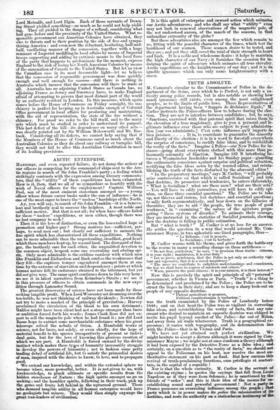ARCTIC ENTERPRISE.
HARDSHIP, and even repeated failure, do not damp the ardour of our officers in competing for the command of ships sent to the An- tic regions in search of Sir John Franklin's part; a feeling which strikingly contrasts with the expression among literary commenta- tors, that the "utility" of these expeditions has been exhausted. How is it, then, that we all of us sympathize so heartily with the wish of Naval officers for the employment? Captain William Peel, son of the most eminent statesman amongst us—a young officer whose future career basks under the sun of influence—he is one of the most eager to brave the " useless " hardships of the North.
Ay, you will say, in search of Sir John Franklin it is a benevo- lent and brotherly zeal to suocour the helpless. A most noble and sufficient motive. But that is not all ; for when have officers failed for these " useless " expeditions, or men either, though there was no lost company to seek ? Then it is the love of distinction, or even the less exalted hope of promotion and higher pay ? Strong motives too—sufficient, per-
haps, to send men out; clearly not sufficient to animate •the fine spirit which has characterized all these expeditions. Nothing can be more admirable than the unpretending, steadfast, goodheart whichthose menhave koptup, by seaand land. The disregard of dan- ger, the brotherly care for each other, the unqualified devotion to the common object, bespeak some one overruling and abiding spi- rit. Only more admirable is the sublime -candour with which men like Franklin and Richardson and Back confess the weaknesses that they felt—the captious temper engendered amongst them at one time by the extreme of starvation and despondency ; points at which human nature felt its endurance strained to the uttermost, but yet did not give way. The same spirit continues down to this very hour : we see it in latest narratives from Kotzebue's Straits ; we see it in this pressure of officers to obtain commands in the new expe- dition through Lancaster Sound.
The greatest discoveries of science have not been made by those seeking tangible profit. When Lord Worcester sat dreaming over the tea-kettle, he was not thinking of railway dividends ; Newton did not try to make a market of the principle of gravitation ; Harvey reclaimed the circulation of the blood to his own detriment; eo might have been silent had not a storge stronger than lucre or ambition forced forth his words ; James Clark Ross did not ex- pect to sell the magnetic pole when he had found it ; nor did Lord Rosso hope to extract some merchantable substance when his great telescope solved the nebula of Orion. A Humboldt works at science, not for lucre, not solely, or even chiefly, for the hope of material benefit to his species irrespectively of present or indivi- dual gain, but for the love of knowing tiiis glorious creation of which we are part. A Humboldt is forced onward by the divine instinct which makes these tykes of humanity incessantly struggle to develop the powers of humanity ; not to fashion some petty trading detail of artificial life, but to satisfy the primordial desires of man, inspired with the desire to know, to love, and to propagate good.
We extend our knowledge, and within the extended sphere we become -wiser, more powerful, better. It is not given to us, with foreknowledge, to pluck ultimate or specific results from the hidden storehouse of Nature : the high spirits amongst us go on seeking ; and the humbler spirits, following in their track, pick up the gems and fruits left behind in the upturned ground. Those who demand tangible utility in all human enterprise would have no geologists but miners. They would then simply expunge the great van-leaders of civilization.
It Is this splint of enterprise and onward action which animates our Arctic adventurers ; and who shall say what " utility " even may not lurk in renewed observations of the magnetic pole, of the not understood aurora, of the march of the seasons, in that unfamiliar extremity of the globe ?
But these adventures also are amongst the few which remain to
us, fi with the peaceful character of the times, which test the hakihe• 'of our seamen. Those seamen desire to be tested, and they areand yet they still covet the trial of their strength in heart and limb. It is a noble and wholesome desire : it helps to maintain the high character of our Navy; it furnishes the occasion for in- dulging the spirit of adventure which animates all true chivalry. Arctie expeditions are the knighterrantry of our day ; and it is an ignoble ignorance which can only name knighterrantry with a sneer.


























 Previous page
Previous page